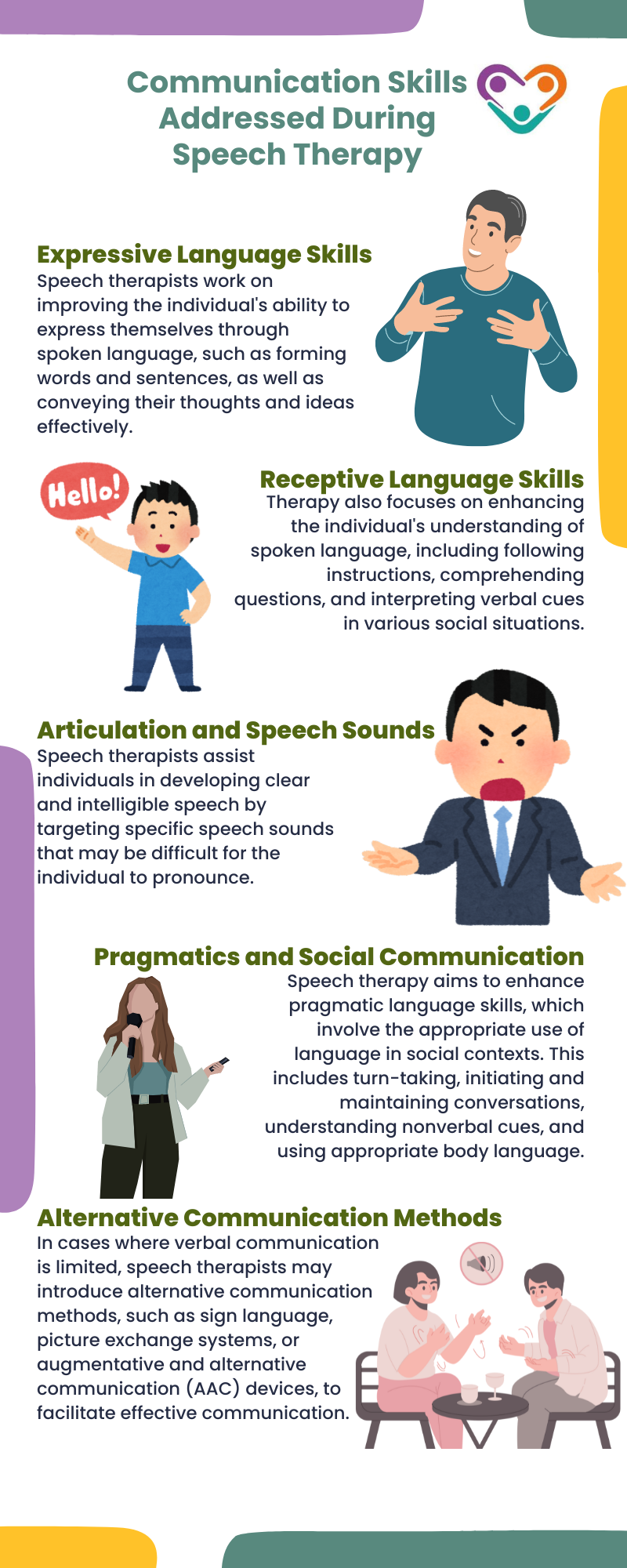Speech therapy plays a crucial role in supporting individuals with autism in improving their communication skills and enhancing their overall quality of life. It usually begins with an initial evaluation conducted by a trained speech therapist. This evaluation helps identify the individual’s strengths and areas needing support in terms of speech and communication.
The therapist then works closely with the individual and their caregivers to gain a comprehensive understanding of their unique needs and challenges.
Based on the evaluation findings, the speech therapist then establishes personalized goals for the individual. These goals are designed to target specific areas of improvement, such as expressive language skills, receptive language skills, articulation, pragmatics, or social communication.
The goals are tailored to the individual’s abilities and focus on enhancing their communication abilities within their daily life and social interactions.

Types of Communication Skills Addressed
Speech therapy for autism encompasses a wide range of communication skills that are addressed during therapy sessions. These skills include both verbal and nonverbal communication, as well as other aspects related to language comprehension and expression.
Let’s look at some of the key communication skills addressed in speech therapy for autism:

Speech therapy for autism takes a comprehensive approach, addressing the specific communication needs of each individual. By targeting these communication skills, individuals with autism can make significant progress in their ability to express themselves, understand others, and engage in meaningful social interactions.

Effectiveness of Speech Therapy
Speech therapy focuses on addressing various aspects of communication, including speech clarity, language comprehension, and expressive language skills. Just like the other therapies for autism, speech therapy sessions are tailored to meet the unique needs of each individual, considering their strengths and challenges.
By working with a speech therapist, individuals with autism can develop and improve their ability to communicate effectively. This includes enhancing speech production, articulation, and fluency.
Speech therapy also addresses nonverbal communication skills, such as understanding and using gestures, facial expressions, and body language.
Through structured interventions and techniques, speech therapy helps individuals with autism develop their receptive and expressive language skills. This includes building vocabulary, improving sentence structure, and enhancing communication in various social contexts.
The goal is to empower individuals with autism to express their thoughts, needs, and feelings more efficiently, fostering greater independence and self-confidence.
Improvements in Social Interactions
In addition to improving communication skills, speech therapy for autism has significant benefits for social interactions.
Many individuals with autism face challenges in understanding social cues, engaging in conversations, and building relationships. Speech therapy addresses these difficulties by providing explicit training and focused treatments to support the development of social interaction abilities.
Speech therapists work with individuals with autism to improve their social skills, such as turn-taking, listening, and initiating and maintaining conversations. They may use role-playing, social stories, and visual aids to help individuals with autism understand social expectations and navigate social situations more effectively.
By enhancing social skills, speech therapy helps individuals with autism develop meaningful connections with others, fostering a sense of belonging and improving their overall quality of life.
Improved social interactions also contribute to better integration and participation in various settings, including school, community, and work environments.

Early Intervention and Outcomes
Early intervention plays a crucial role in achieving positive outcomes when it comes to speech therapy for individuals with autism. Research has shown that early intervention can lead to improved results and increased abilities in individuals with autism, especially in the context of language therapy.
Importance of Early Intervention
Early intervention refers to the identification and initiation of therapy services as soon as signs of autism are observed or suspected. This early support is critical because it allows for timely intervention during a period of rapid brain development when the brain is most receptive to learning and adapting.
Research has demonstrated that early intervention in children with autism can lead to significant improvements in various areas, including language development, social skills, and overall functioning.
In fact, studies have shown that early language therapy can increase the ability of non-verbal children to become verbal. It has been observed that this effect is not as pronounced in children over the age of five, highlighting the critical importance of early intervention.
By providing early speech therapy, professionals can help children with autism develop vital communication skills, improve their ability to express themselves, and enhance their overall quality of life.
Early intervention sets the foundation for continued progress and maximizes the potential for positive outcomes.
Development of Language Skills
Speech therapy for individuals with autism focuses on addressing the unique communication challenges they may face. Through targeted interventions and specialized techniques, speech therapists work to develop and enhance language skills in individuals with autism.
Speech therapy can assist in improving receptive language skills, which involve understanding and comprehending spoken language. It also targets expressive language skills, enabling individuals to effectively express their thoughts, needs, and desires.
Therapists employ various strategies tailored to the specific needs of each individual. These strategies may include visual aids, such as picture cards or communication boards, to support comprehension and expression. Roleplaying and social interaction exercises are also used to enhance social communication skills.
The ultimate goal of speech therapy is to equip individuals with autism with the tools they need to communicate effectively in various settings, fostering independence, self-confidence, and improved overall development.
If you’re seeking specialized ABA therapy in New Jersey, Indiana, Georgia, and New York, Golden Care offers comprehensive services tailored to meet the unique needs of each individual. Contact us to learn more or book a consultation today.
Sources:
https://www.autismspeaks.org/speech-therapy
https://www.healthline.com/health/autism/speech-therapy-for-autism
https://www.verywellhealth.com/speech-therapy-for-autism-the-basics-260577



